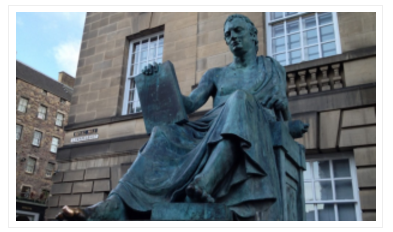The Self
- Hume subtracted anything supernaturally special from the concept of the self, arguing that there is no coherent self or “I.” Instead, each of us is nothing but a bundle of perceptions. “When I enter most intimately into what I call myself,” he wrote, “I always stumble on some particular perception or other, of heat or cold, light or shade, love or hatred, pain or pleasure. I never can catch myself at any time without a perception, and never can observe any thing but the perception.” This subtraction may seem initially disheartening. Further reflection, however, reveals its many benefits.

- Who we are depends on how we think, what causes our actions, and how we choose to live. Who we are is what we construct, not what we discover.
How to Think
- There is no such thing as chance in the world, yet nothing is more free than the imagination of man.
- Reason requires the existence of a motivating desire, but reason also informs and corrects the passions.
- “There is just one phenomenon which may prove that it is not absolutely impossible for ideas to arise independent of impressions. Suppose a person, enjoying good sight, be presented with all the shades of blue from the deepest to the lightest, except a single one. Even if he has never had the fortune to meet with the missing shade, it will be possible for him to imagine it.”
- Hume beguiled many later philosophers with his problem of induction – a large number of something doesn’t prove conclusions based on that large number. That all observed swans were white didn’t mean that all future swans would be white, which was proven upon the later discovery of black swans.
- He divided the mind’s contents into impressions and ideas. Impressions are our immediate perceptions, and ideas are our concepts and thoughts that we are able to form of the things we are no longer experiencing. The point was to insist that there is nothing in the mind – even the most abstract thought – that is not simply sensation transformed.
- If an idea can’t be traced back to its original impressions, then it can not be an idea based in reality, but rather imagination. Hume used this notion to skeptically critique the ideas of a devine occupier, the self, and causation.
Causation
- There are always causes, even if the power behind them is hidden from us, as with medicines or clouds.
- We associate ideas because of their resemblance (we see a painting and think of the original), their contiguity (resemblance in time and place), or their perceived cause and effect (think of a wound and we can not avoid thinking of pain).
- He wrote that, “If you tell me that any person is in love, I easily understand your meaning, but can never mistake that conception for the real passion, for even the colors of poetry can never paint natural objects.”
- We assume that certain things are connected just because they commonly occur together, but a genuine knowledge of any connection is mere habit of thought.
How to Live
- Hume’s Law is generally put as “It is never possible to deduce evaluative conclusions from factual premises.” This is also known as the is/ought problem. Basically, being judgmental belongs more in the realm of emotions than facts. You can say, “You should be “blankety blank,” because that would make me feel better,” but not because of anything factual about “blankety blank.”
- Hume held that people can exhibit qualities that give happiness to themselves as well as being useful to others. These qualities were justice, faithfulness, and politeness, in addition to benevolence, which he regarded as the highest general quality a person can have.
- Virtues, such as justice, faithfulness, politeness, and benevolence, are qualities that a person can develop. In this sense, overall altruism toward others is a sign of personal development.
- To ascertain our obligation, we naturally place our sentiments into the public arena for scrutiny to see if others concur.
- We should not let philosophy interfere too much with real life. Be a philosopher, but amidst all of your philosophy, be still a man. This was Hume’s response to the inclination of taking his skepticism too far (Many observations of white swans does actually make it very likely your next swan will also be white).








Leave a comment